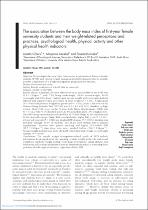| dc.contributor.author | Cilliers, Janetta | |
| dc.contributor.author | Senekal, Marjanne | |
| dc.contributor.author | Kunneke, Ernesta | |
| dc.date.accessioned | 2023-06-07T09:17:22Z | |
| dc.date.available | 2023-06-07T09:17:22Z | |
| dc.date.issued | 2006 | |
| dc.identifier.citation | Cilliers, J. et al. (2006). The association between the body mass index of first-year female university students and their weight-related perceptions and practices, psychological health, physical activity and other physical health indicators. Public Health Nutrition, 9(2), 234 - 243. https://doi.org/10.1079/PHN2005846 | en_US |
| dc.identifier.issn | 1475-2727 | |
| dc.identifier.uri | https://doi.org/10.1079/PHN2005846 | |
| dc.identifier.uri | http://hdl.handle.net/10566/9054 | |
| dc.description.abstract | To investigate the association between the weight status of first-year female
students (FYFS) and various weight management-related characteristics to identify
possible components of a weight management programme for students. Mean (^standard deviation (SD)) body mass index (BMI) of the FYFS was
21.8 ^ 2.6 kg m22
, with 7.2% being underweight, 81.9% normal-weight, 10.0%
overweight and 0.8% obese. Underweight, normal-weight and overweight students
differed with regard to their perception of their weight (P , 0.001), weight goals
(P , 0.001) and previous weight-loss practices (P , 0.001). Mean ^ SD score on the
26-item Eating Attitudes Test (EAT-26) was 8.5 ^ 9.0 with 8.4% classified as high
scorers. Mean ^ SD score on the 34-item Body Shape Questionnaire (BSQ) was
87.7 ^ 32.2, with 76.1% classified as low, 11.9% as medium and 11.9% as high scorers.
The self-concept questionnaire indicated that 36.7% had a high, 43.9% a medium and
19.4% a low self-concept. Higher BMI correlated with a higher BSQ score (P , 0.001),
a lower self-concept (P ¼ 0.029) and a higher EAT-26 score (P , 0.001). Smoking was
prevalent amongst 13.1% of students, and 51.2% used vitamin and/or mineral
supplements. Students who quitted smoking had higher (P ¼ 0.006) BMI
(22.7 ^ 2.9 kg m22
) than those who never smoked before (21.6 ^ 2.5 kg m22
). | en_US |
| dc.language.iso | en | en_US |
| dc.publisher | Cambridge University Press | en_US |
| dc.subject | Public health | en_US |
| dc.subject | Dietetics | en_US |
| dc.subject | Higher education | en_US |
| dc.subject | Psychological health | en_US |
| dc.subject | South Africa | en_US |
| dc.title | The association between the body mass index of first-year female university students and their weight-related perceptions and practices, psychological health, physical activity and other physical health indicators | en_US |
| dc.type | Article | en_US |

